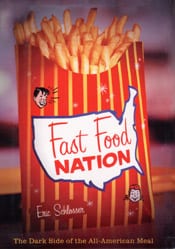Book review
This article was originally published in July 2001
Featuring books available at PCC
Several PCC members got involved in a co-op wide “you pick the chapter” book review of “Fast Food Nation.” Following are excerpts from two.
(The next featured book will be “Stolen Harvest,” by Vandana Shiva. Buy the book, read the book, join the fun! Your comments may appear in the Sound Consumer, or on our website. To get started, call Dennis Weaver, 425-774-8971.)

The McLibel Case
Chapter review by John Abbotts
“Fast Food Nation” by Eric Schlosser is very much a critique of the fast food industry. In chapter 10, “Global Realization,” he also provides an inspirational example of activists who successfully challenged McDonald’s, the industry leader.
The expansion overseas of U.S. fast food companies provoked Greenpeace activists in London to distribute leaflets criticizing the Golden Arches. In 1990, McDonald’s sued the distributors, even though they circulated leaflets written by others. It took advantage of British libel laws, which place severe burdens of proof on defendants.
Two of them, Helen Steel and Dave Morris, fought back. With assistance from the McLibel Support Campaign, an international network of activists, they put McDonald’s on public trial. Through the trial and subsequent appeal, judges concluded that McDonald’s exploited children through its advertising, endangered the health of regular customers, paid unreasonably low wages, treated its workers badly, and opposed union activities worldwide. During the trial, McDonald’s also admitted that it had infiltrated London Greenpeace and spied on members, with the assistance of Scotland Yard.
Nonetheless, because some statements in the leaflet could not be proved, even the appeal court ordered the defendants to pay heavy damages. Embarrassed by the negative publicity, McDonald’s announced it would not seek to collect damages and no longer would seek to stop London Greenpeace from distributing leaflets.
Schlosser provides a ray of optimism by retelling this story of citizens who challenged a fast food industry giant. As the author concludes, “After intimidating British critics for years, the McDonald’s Corporation picked on the wrong two people.”
John Abbotts serves as a research scientist at a large university in Seattle. Responsibility for this article lies solely with him.
Meatpackers and politicians
Review by Annie Roach
Chapter 9 from “Fast Food Nation,” “What’s in the Meat”, reveals the close relationship meatpacking lobbyists have had with politicians and how that has influenced the absence of laws, rules and regulations affecting the industry.
If elected representatives created stricter guidelines for meat processors, the USDA could then provide the necessary oversight. Instead, we witness inhumane slaughtering, poorly trained workers, processing lines that run so fast inspections cannot be made, and unsanitary conditions. These factors and more contribute to the spread of various pathogens in meat, increasing health risks to consumers.
As E.coli outbreaks continue, our government has done little to control them at the source. If there’s a meat recall, by law the USDA is unable to say where the recalled meat was sold. It’s our right to know when our health is at risk; our politicians must be lobbied to represent consumer interests before industry profits.
Schlosser’s chaper “What’s in the Meat” caused me concern. Read the whole book. It will change forever the way you view the system and fast food.
Annie Roach just received a two-year AA degree from Shoreline Community College. Next year, she’ll attend WSU.
